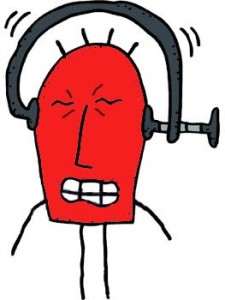 “I’ve got to have a donut—the kind with chocolate icing and sprinkles.” “I really, really want some crispy, salty French fries and a strawberry shake.” But, are you really hungry or is it your head that’s yapping at you?
“I’ve got to have a donut—the kind with chocolate icing and sprinkles.” “I really, really want some crispy, salty French fries and a strawberry shake.” But, are you really hungry or is it your head that’s yapping at you?
Your head can be very proficient at ringing the mindless eating bell. It’s often the culprit when you find yourself eating even though your body isn’t physically hungry. For instance, it’s not unusual to eat in response to a learned behavior. Does your head tell your body to eat everyday at noontime — whether or not your body actually needs food?
What’s Head Hunger?
Head hunger comes on suddenly. Does this sound familiar: you’re not hungry – and then all of a sudden you absolutely must have a candy bar or a slice of pizza, or a warm and gooey chocolate chip cookie.
Head hunger might appear as a craving, or when you find yourself mindlessly munching, or when you eat in response to triggers – and you’ve not stopped for a second to ask yourself if you’re really hungry (or maybe you have and decided to ignore the answer).
Head hunger can happen at any time — with no physical symptoms — and might be triggered by time cues and sensory triggers, like smell, taste, or texture. Obsessing about food, certain habits (like watching TV, working on the computer, or driving), and emotional or personal triggers can all make you think that you’re hungry when you really aren’t.
What Does A Growling Stomach Mean?
Physical hunger, or stomach hunger, comes on slowly and usually happens two to four hours after you’ve last eaten. With true physical hunger you might have an empty or growling stomach, lightheadedness, hand tremors, fatigue, or a headache. It’s your body’s way of telling you that it needs fuel and it’s time to eat. Depending upon how truly physically hungry you are you can be satisfied with almost anything – unlike the cravings for sugar, salt, fat that frequently ring the head hunger bell.
Calorie Savers
Head hunger will eventually go away if you ignore it. Your body isn’t telling you it needs food for sustenance. It’s your head talking to you, and sometimes it’s doing so in quite a loud voice.
Try to put off shoving some food into your mouth by distracting yourself and not engaging in conversation with your head hunger. It usually goes away if you divert your attention. Often a cup of tea or coffee or a glass of water will do the trick, too.
If your hunger is really screaming at you it might be tough to ignore. Ask yourself when you last ate. If it’s been three to four hours you might actually be physically hungry and not just head hungry. Have something to eat!
This post is a selection from my upcoming book about 50 easy ways to save calories.
